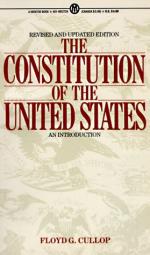
|
| Name: _________________________ | Period: ___________________ |
This test consists of 15 multiple choice questions and 5 short answer questions.
Multiple Choice Questions
1. Attending the convention in Philadelphia for revision of the Articles of Confederation were delegates from all but which state?
(a) Rhode Island.
(b) Connecticut.
(c) New Jersey.
(d) Virginia.
2. Article II addresses the executive branch and includes how many sections?
(a) 1.
(b) 3.
(c) 2.
(d) 4.
3. The Congress separated into the House of Representatives and the Senate is the result of a dispute termed what?
(a) "The Great Compromise".
(b) "The Great Debate".
(c) "The Great Dispute".
(d) "The Great Conflict".
4. If a person's preferred candidate is not elected, there will be another election in which that candidate has what option?
(a) Request a vote ballot recount be taken.
(b) Try only once more for election by a majority vote.
(c) Try again, but only for a different position.
(d) Try again for election by a majority vote.
5. The U.S. is a group of individual states that afford certain specific duties and responsibilities to which government?
(a) State.
(b) Independent.
(c) United.
(d) Central.
6. Giving a limited amount of power to the central government and allowing each state to keep the majority of laws and powers was what?
(a) The basis for a centralized government.
(b) The basis of the initial document.
(c) The basis of the revised document.
(d) The basis of a socialist document.
7. Cullop asserts which term for American government is correct?
(a) Independent republic.
(b) Republican democracy.
(c) Democratic confederation.
(d) Democratic republic.
8. Who was the 16th President of the United States?
(a) Alexander Hamilton.
(b) James Madison.
(c) Abraham Lincoln.
(d) John Adams.
9. How did people eventually refer to this initial document?
(a) Articles of Confederation.
(b) Pledge of Allegiance.
(c) Constitution.
(d) ACPU.
10. To be a member of the House of Representatives for any state having more than two representatives, the individual must live in the district within the state he or she represents, except for which two states?
(a) New Mexico, North Dakota.
(b) New Mexico, Nevada.
(c) Arizona, Utah.
(d) North Dakota, Nevada.
11. Elections give all citizens the opportunity to make their voices known, and to choose the official that would do what?
(a) Best represent their hometown.
(b) Best represent their interests.
(c) Best represent their political party.
(d) Best represent their state.
12. Article III covers the judicial branch and includes how many sections?
(a) 5.
(b) 3.
(c) 2.
(d) 4.
13. The Articles of Confederation and Perpetual Union was introduced in what year?
(a) 1777.
(b) 1779.
(c) 1783.
(d) 1781.
14. The U.S. government is currently located where?
(a) Boston, Massachusetts.
(b) Philadelphia, Pennsylvania.
(c) Washington, the District of Columbia.
(d) New York, New York.
15. What is one check on the Supreme Court held by the Congress?
(a) Congress may withhold consent to treaties approved by Supreme Court.
(b) Senate may refuse to give consent to a Supreme Court appointment.
(c) May override Supreme Court decisions by 51% vote of both houses.
(d) Congress may refuse to give consent to a Supreme Court appointment.
Short Answer Questions
1. What type of democracy is that in which the people handle government matters on their own behalf?
2. The author stipulates that how many different kinds of democracy exist?
3. Some say the government of the U.S. is one in which the people are responsible for self-governing, or what Cullop calls what?
4. Section 10 of Article I covers power that are denied to whom?
5. Whom was the final draft of the Constitution written by?
|
This section contains 518 words (approx. 2 pages at 300 words per page) |

|




